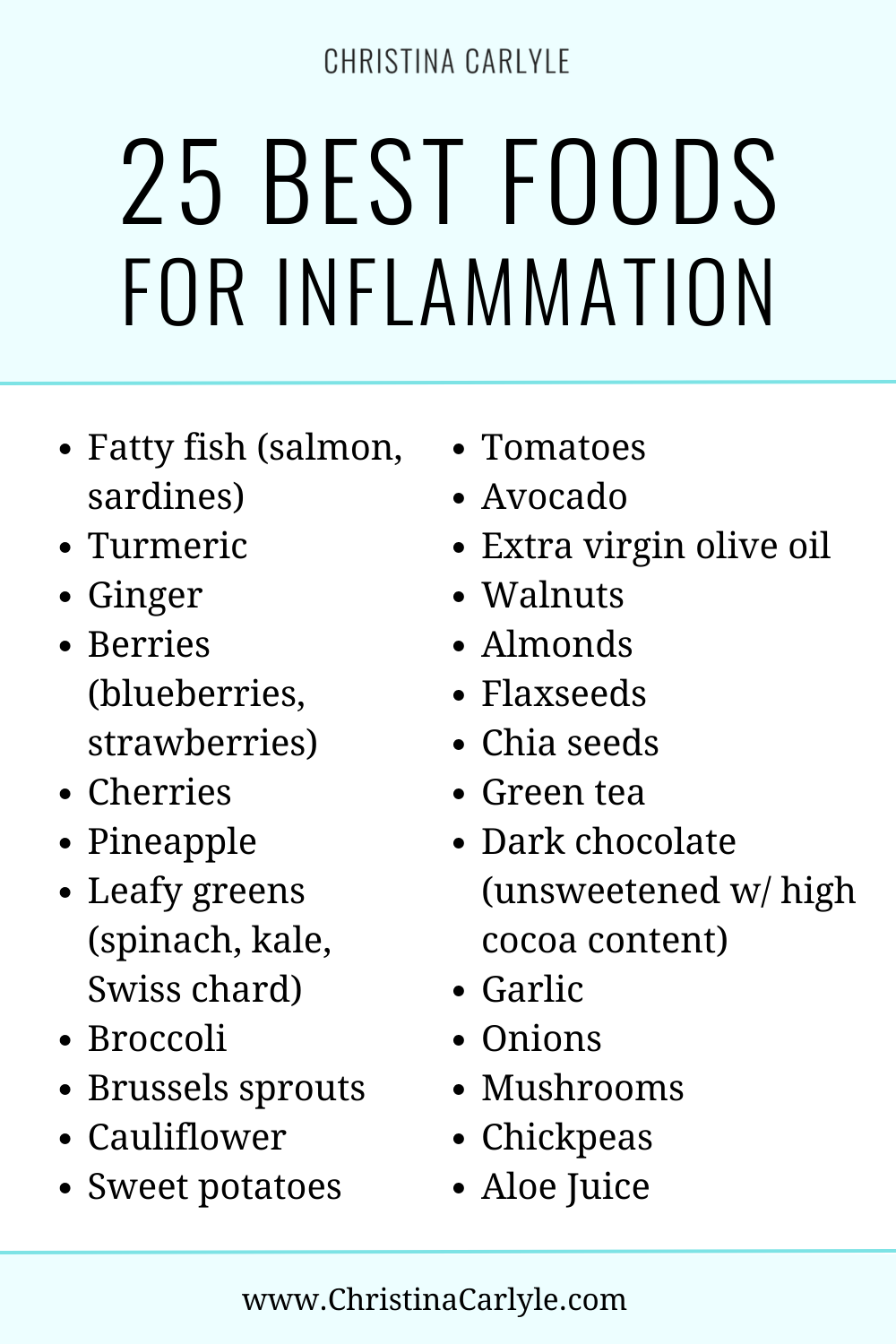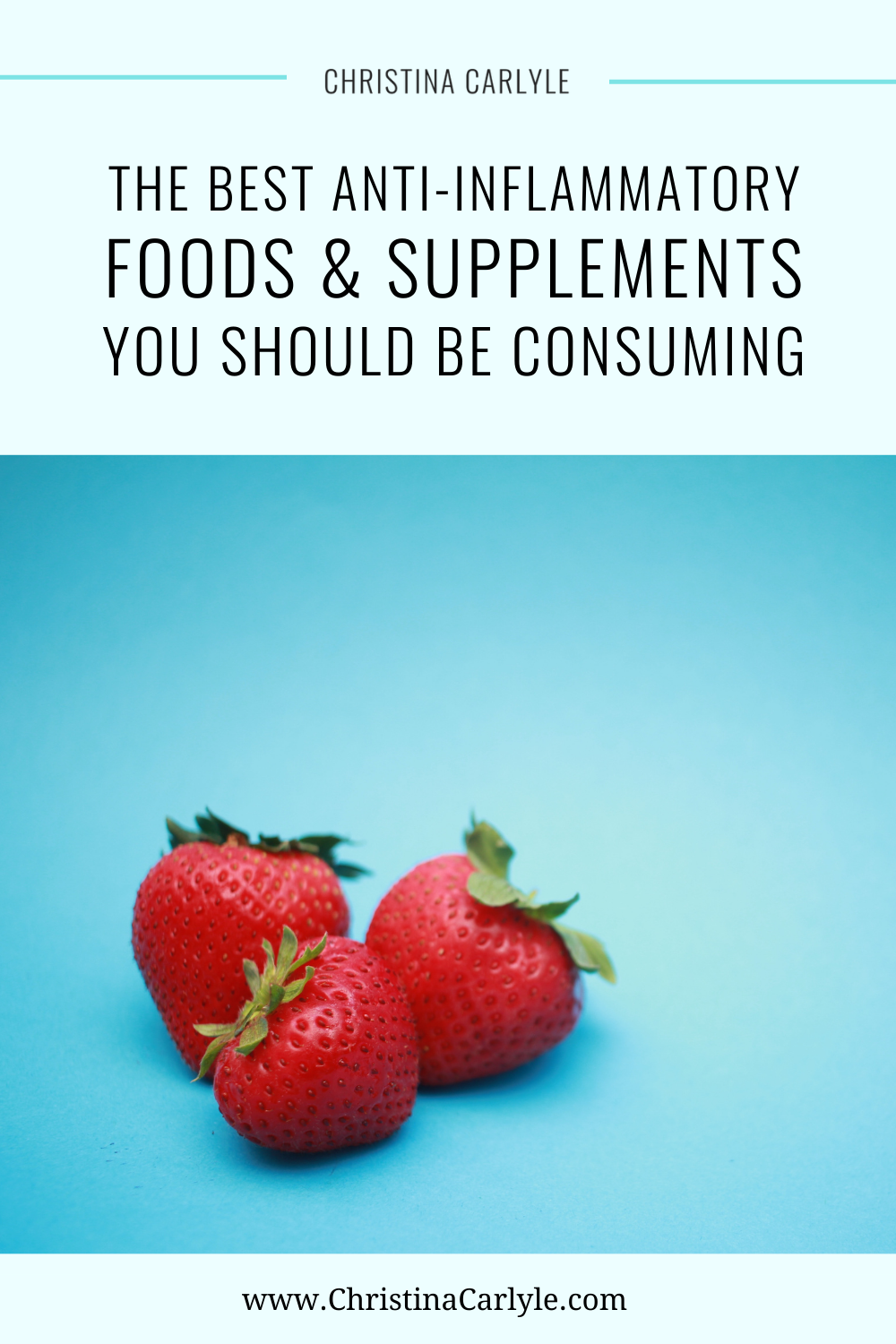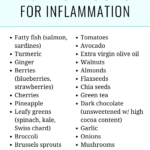Last Updated on July 17, 2023
You’ve probably heard that you need to be eating anti inflammatory foods, am I right?
Inflammation is a root cause of many diseases, weight gain, stubborn fat, mood issues, fatigue, and more.
The inflammation from a single cigarette leaves the body in 2 hours.
But the inflammatory aftermath after eating just one thing, like inflammatory cooking oil, can cause inflammation in the body for up to 4 days. And inflammatory oils are in everything including ‘healthy’ things like rotisserie chicken, salad dressings, mayonnaise, hummus, condiments, nuts, and seeds.
That’s why you need the following best anti inflammatory foods and supplements in your life.
WHY YOU SHOULD EAT ANTI INFLAMMATORY FOODS
Anti-inflammatory foods offer several benefits for overall health (physical and mental) and well-being. Some of the key benefits include:
- Reduced (chronic) Inflammation: Chronic inflammation is associated with various health conditions, including cardiovascular disease, diabetes, cancer, and neurodegenerative disorders. Anti-inflammatory foods can help lower inflammation markers in the body, potentially reducing the risk of chronic diseases.
- Improved Heart Health: Many anti-inflammatory foods, such as fatty fish, olive oil, nuts, and berries, are also heart-healthy. They can help lower cholesterol levels, improve blood pressure, reduce oxidative stress, and enhance blood vessel function, all of which contribute to better cardiovascular health.
- Enhanced Immune Function: Chronic inflammation can impair immune function, making the body more susceptible to infections and other illnesses. Anti-inflammatory foods, rich in antioxidants, vitamins, and minerals, support immune system function and help protect against infections.
- Reduced Pain and Discomfort: Inflammatory conditions such as arthritis, joint pain, and inflammatory bowel diseases can cause discomfort and pain. Consuming anti-inflammatory foods, along with a well-balanced diet, can help alleviate symptoms and improve the quality of life for individuals with these conditions.
- Improved Gut Health: Chronic inflammation in the gut can lead to conditions like irritable bowel syndrome (IBS), inflammatory bowel disease (IBD), and leaky gut syndrome. Anti-inflammatory foods, particularly those high in fiber and probiotics, can promote a healthy gut microbiome, support digestion, and reduce inflammation in the gastrointestinal tract.
- Brain Health and Cognitive Function: Chronic inflammation has been linked to neurodegenerative disorders like Alzheimer’s disease and Parkinson’s disease. Anti-inflammatory foods, such as berries, fatty fish, turmeric, and leafy greens, contain nutrients and bioactive compounds that may help protect brain health and support cognitive function.
I’ve ranked them in order from highest to lowest… so eat your want from the top down to help get the most anti inflammatory effects.
THE 25 BEST ANTI INFLAMMATORY FOODS
- Fatty Fish (salmon, mackerel, sardines): Fatty fish are rich in omega-3 fatty acids, particularly EPA and DHA, which have been shown to reduce inflammation in the body and help lower levels of inflammatory markers.
- Turmeric: Turmeric contains curcumin, a compound with potent anti-inflammatory properties. Curcumin helps block inflammatory pathways and reduces the production of inflammatory cytokines.
- Ginger: Ginger contains gingerol, a bioactive compound known for its anti-inflammatory effects. It can inhibit the production of pro-inflammatory chemicals and may help reduce inflammation in various conditions.
- Berries (blueberries, strawberries, raspberries): Berries are rich in antioxidants and phytochemicals that help combat oxidative stress and inflammation. They also contain high amounts of fiber, which supports gut health and may indirectly reduce inflammation.
- Cherries: Cherries, especially tart cherries, contain anthocyanins and other compounds that have been shown to possess anti-inflammatory properties. They can help reduce inflammation and provide relief from conditions such as gout and arthritis.
- Pineapple: Pineapple contains bromelain, an enzyme with anti-inflammatory properties. Bromelain has been studied for its potential to reduce inflammation, particularly in conditions such as osteoarthritis.
- Leafy Greens (spinach, arugula, kale, Swiss chard, etc.): Leafy greens are packed with antioxidants, vitamins, and minerals that have anti-inflammatory properties. They also provide fiber, which supports gut health and may help reduce systemic inflammation.
- Broccoli: Broccoli is rich in antioxidants, including sulforaphane, which has been shown to have anti-inflammatory effects. It also contains other compounds that help activate the body’s antioxidant defenses. Broccoli sprouts are also anti-inflammatory.
- Brussels Sprouts: Brussels sprouts are a cruciferous vegetable that contains compounds called glucosinolates, which can help reduce inflammation and support overall health.
- Cauliflower: Cauliflower contains antioxidants and anti-inflammatory compounds, such as sulforaphane and indole-3-carbinol. These compounds help protect against inflammation and oxidative stress.
- Sweet Potatoes: Sweet potatoes are rich in antioxidants, particularly beta-carotene and vitamin C, which help combat inflammation. They also provide fiber and complex carbohydrates that contribute to a balanced diet.
- Tomatoes: Tomatoes contain lycopene, a powerful antioxidant that has been associated with reduced inflammation. They also provide other beneficial compounds like vitamin C and beta-carotene.
- Avocado: Avocado is a source of healthy fats, including monounsaturated fats, which have anti-inflammatory properties. It also contains antioxidants and fiber, contributing to its potential anti-inflammatory effects.
- Extra Virgin Olive Oil: Extra virgin olive oil is rich in monounsaturated fats and polyphenols, which have anti-inflammatory properties. Its beneficial effects on inflammation have been attributed to compounds such as oleic acid and oleocanthal.
- Walnuts: Walnuts are a good source of omega-3 fatty acids, as well as antioxidants and polyphenols. They have been shown to reduce inflammation and may provide cardiovascular benefits.
- Almonds: Almonds are packed with antioxidants, including vitamin E, which can help reduce inflammation. They also provide healthy fats and fiber, contributing to overall health.
- Flaxseeds: Flaxseeds are rich in alpha-linolenic acid (ALA), an omega-3 fatty acid, and lignans, which have anti-inflammatory properties. They can help reduce markers of inflammation and promote heart health.
- Chia Seeds: Chia seeds are high in omega-3 fatty acids, fiber, and antioxidants, which have been associated with anti-inflammatory effects. They can help reduce inflammation and support digestive health.
- Green Tea: Green tea contains polyphenols, particularly catechins, which have potent antioxidant and anti-inflammatory properties. Regular consumption of green tea has been associated with reduced inflammation and improved overall health.
- Dark Chocolate (with high cocoa content): Dark chocolate is rich in flavonoids, specifically cocoa flavanols, which have antioxidant and anti-inflammatory effects. Moderate consumption of dark chocolate may have positive effects on inflammation and cardiovascular health.
- Garlic: Garlic contains sulfur compounds that have been shown to possess anti-inflammatory properties. These compounds may help reduce inflammation and contribute to overall health.
- Onions: Onions are a source of various antioxidants, including quercetin, which has anti-inflammatory effects. Regular consumption of onions has been associated with reduced inflammation and improved immune function.
- Mushrooms: Certain varieties of mushrooms, such as shiitake and oyster mushrooms, contain bioactive compounds that have immune-modulating and anti-inflammatory effects. They may help reduce inflammation and support overall health.
- Chickpeas: Chickpeas are rich in fiber and contain antioxidants and other compounds that have anti-inflammatory properties. They can contribute to a balanced diet and support gut health.
- Aloe: Aloe vera contains compounds like polysaccharides that may have anti-inflammatory effects. These compounds can help reduce inflammation and support digestive health. You can eat the inner fillets of the aloe, which can be found in the produce section at most grocery stores. You typically have to but the entire ‘sprig’ which is gigantic and will spoil within a few days after cutting. Aloe fillet/gel has a unique taste and texture. Because of this, I recommend supplementing with aloe juice instead of eating it.
For the best results have 1-5 servings of anti-inflammatory foods at every meal. I also recommend eating the organic options of these foods to avoid exposure to inflammatory chemical coatings, pesticides, and fertilizers.
Best Anti-Inflammatory Supplements
There are also a few anti-inflammatory supplements I recommend because they’re incredibly effective and necessary to prevent and reverse inflammation. They are:
- Fish oil (Omega-3 fatty acids): It’s hard to eat fish every day so it’s great to use fish oil supplements. Fish oil supplements contain omega-3 fatty acids, such as eicosapentaenoic acid (EPA) and docosahexaenoic acid (DHA). These fatty acids have been shown to reduce the production of inflammatory compounds, such as prostaglandins and cytokines, thereby reducing inflammation in the body. I recommend this brand.
- Turmeric: Turmeric supplements are great because eating turmeric isn’t always realistic. Turmeric contains a compound called curcumin, which has potent anti-inflammatory properties. Curcumin inhibits the activity of several inflammatory enzymes, blocks signaling molecules involved in inflammation, and reduces the production of inflammatory cytokines. I recommend this turmeric supplement most. I also love, use, and recommend this organic (medicinal) turmeric tea. It makes a great post-workout treat, too!
- Aloe vera juice: I definitely recommend drinking aloe juice instead of eating it (due to the taste and texture of the fillets.) Aloe vera contains various compounds, including polysaccharides, that may have anti-inflammatory effects. These compounds can help reduce inflammation by inhibiting inflammatory enzyme activity, reducing inflammatory mediators’ release, and modulating the immune response. I love, use, and recommend this aloe juice.
- Probiotics: Probiotic supplements contain beneficial bacteria that support a healthy gut microbiome. By promoting a diverse and balanced gut microbiota, probiotics can help modulate the immune response and reduce chronic low-grade inflammation associated with various conditions, including inflammatory bowel disease. I like these probiotics a lot.
- This Protein & Greens Powder: This protein powder has an ORAC score of 40,000. ORAC stands for Oxygen Radical Absorbance Capacity, which is a measurement used to assess the antioxidant capacity of foods, beverages, and supplements. The ORAC score quantifies the ability of a substance to neutralize free radicals, which are unstable molecules that can cause oxidative damage in the body. For reference, a 100-gram (3.5 oz.) serving of blueberries has an ORAC score of 2400. Just one serving of this protein powder has the antioxidant content of 24 servings of fruits and vegetables.
- Dragon’s Blood: Dragon’s blood, also known as “Sangre de Drago” or “Croton lechleri sap,” is a dark red resin derived from the sap of various tree species, primarily from the Croton genus. Despite its intriguing name, it does not come from mythical creatures like dragons. Dragon’s blood has a long history of use in traditional medicine, particularly in South America, where it has been used by indigenous communities for various purposes, including wound healing, gastrointestinal issues, and inflammation. It has an ORAC score of 2,000,000 and has been shown to stop chronic inflammation and accelerate wound healing. A little of this stuff goes a long way. Take 2 drops of this Dragon’s blood in water on an as-needed basis. (i.e. if you’re in pain, sick, or need help healing internally or externally.)
Those are my top 6 go-to recommendations for anti-inflammatory supplements.
It’s also important to note that these foods and supplements aren’t going to do much if you’re still consuming other inflammatory foods, drinks, and consumables and not managing your stress properly.
If you need help I recommend my Total Transformation Program… it targets all root causes of metabolic dysfunction (inflammation, gut health, hormones, detox, etc.) simultaneously so you can radically transform the way you look and feel fast. You can lose up to 20 pounds in 4 weeks on the Total Transformation Program.
- Cut out all inflammatory sources of foods, drinks, supplements, and consumables & eat a diet that promotes gut health and healing. You can’t heal the gut simply by eating healthy… you have to avoid the wrong things and eat the right things to heal the gut and reverse inflammation, microbiome, hormone, toxicity, metabolic, and nutrient absorption issues. That’s what my Total Transformation Program does and why it works so well (& quickly!)
- Heal and balance your gut with these Gut Health Supplements.
- Eat high Probiotic and Prebiotic foods with every meal. (at least one serving of both pre/pro per meal.)
- Eat Gut Healing Foods. These have the nutrients, fibers, and plant chemicals needed to heal and balance all aspects of the gut. Eat 1-2 servings of these Gut Healing Foods with every meal.
- Engage in a healthy lifestyle & other healthy habits that support gut health and metabolism (like stress management, hydration, exercise, supplementation, etc. – all of which are covered in my Total Transformation Program.)
- Radically reduce stressors in your life and use healthy coping skills.
- When you combine the right diet + healing protocols & supplements you’ll get results you can see and feel a LOT faster.
If you really want to clean up your diet, heal your gut, reverse inflammation, balance hormones, and get rid of fatigue and cravings – AND lose weight – you need my Total Transformation Program.

4 week before and afters using my Total Transformation Program
When you combine the right diet + healing protocols & supplements you’ll get results you can see and feel a LOT faster.
Remember, if you have gut health symptoms you most likely also have metabolic dysfunction. This free training explains more about metabolic dysfunction & how I fix it so you can lose weight & feel great ASAP.
I hope this list of the best anti-inflammatory foods and supplements helped you.
If it did, let me know in the comments. I always LOVE hearing from you.
xo
Your Coach and Biggest Cheerleader,
![]()








